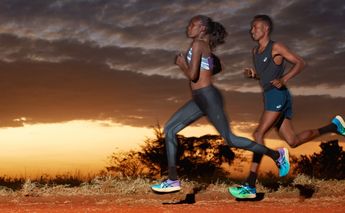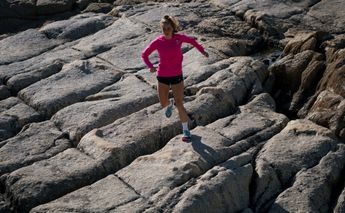ASICS FrontRunner Solly Malatsi and close friend Makashule Gana are currently halfway through a mammoth running challenge. Solly and Makashule set out from Soweto and plan to run some 500kms in 17 days to Lefara Village in their home province of Limpopo, to raise R500 000 to support poor learners.
"The cancellation of running races due to the pandemic left many runners, me included, rather frustrated," explains Solly. "While the introduction of virtual races brought some temporary enthusiasm about running again, the experience eventually faded after several of those races," he says.
According to Solly, races are a big motivational factor for his training. "Perhaps most importantly, to track my development as a runner - whether it’s chasing new PBs or partaking in running challenges, races provide the platform to break human barriers."
To set a goal on which to challenge himself then and have the opportunity to give back to his home village he initiated the #HomeRun project.
"Makashule and I wanted to leverage our passion for running for positive social impact by challenging ourselves to conquer this audacious adventure. Our adventure began on Saturday, 07 August with a daily average of 35kms. To date we have ran 314kms in nine days, with one rest day."
You might not be planning to run 500km, but you could learn from some of the lessons from doing such high mileage in consecutive days Solly has learnt. These are his words:
1. Preparation
I have always been a proponent of the adage 'proper preparation prevents poor performance.' Embarking on a monstrous adventure like this requires clinical preparations in terms of planning the route, setting up water points and planning the pace. Given that we are running 35kms daily, our standard approach was to set up water points every 5th kilometre until 20kms and from then onwards set them up at every 3rd kilometre.
Every evening (where possible) we drive through the route for the following day to familiarise ourselves with it. On the few occasions we couldn’t do this due to laziness, the runs were physically taxing as we were running the route while exploring it. Planning for water points at every 5th kilometre allowed as to have small milestones to celebrate to give us a sense of accomplishment. When are you going to be on the road for long everyday, it’s important to reward yourself small wins to enjoy the sense of fulfilment.
2. Pace management
One of the big decisions we took while training for this The Home Run was to settle on the average pace per kilometre. My marathon PB is 3:45 whereas Makashule’s is 3:20 so we had to settle on a pace that wouldn’t strain our energy levels too much - it's a long haul.
In training we ran approximately 6:30 - 6:45 p/km to allow our bodies to assimilate to that pace for 3 - 4 hours. Sustaining this pace during first seven runs of The Home Run has instilled patience to my running game, something I previously struggled with.
I’m normally a 'gut runner' who mostly discards race strategy on the day based on my adrenaline. But for this, I’ve had to resist flirting with recklessness, since the goal is to reach 500kms in 17 days. When your mission is to cover a massive distance like ours, the focus should be on crossing the finish line alive rather than crashing during it due to unnecessary speed.
3. Support Crew
The right support crew on a long run can boost a runner’s performance. We are blessed that my best friend, Irad, has been the head of logistics for this mission. One he has executed impeccably day in and day out.
We seldom lose time at our water points as he sorts out our water and nutrition (usually bananas), during the run. Immediately afterward he has both our recovery drinks ready.
Even on days where we were joined by some runners, he always made it a point to separate our stuff from everyone’s so that there are no accidental mix-ups.
Within a few days he also picked that we prefer to alternate running shoes for the last 10 - 12kms just. So now every 23rd km he would have another pair of ASICS CUMULUS 22s ready.
4. Proper recovery is essential
The common mistake my social runners make is to succumb to temptation of always running. In a time where most of us are accustomed to rushing into the hustle-and-bustle of work directly after our morning runs, we stay on our feet for too long with little proper rest. Such habits die hard. Going into The Home Run, it was the one key thing I needed to improve on to conserve energy. Our daily post-run routine to date has been to minimise any unnecessary strain on our legs so that we are refreshed for the following day.
As soon as we got into our minibus to drive to our base for the day, the priority was to shower, have breakfast and nap for a few hours. The rest of the day is spent catching up on work and sorting out logistics while trying to keep the feet up as much as possible.
5. Mental strength
To attempt anything as audacious as running 500kms requires mental fortitude to finish. While we are driven by the cause of charity to finish this run, our biggest asset has been our mental strength. The routine of waking up daily to run for four hours at that slow pace (well, it’s unusually slow for our normal runs) in the scorching heat or against vicious southerly headwinds requires resolve.
We made a commitment to each other that come rain or high water, will finish this mission on Sunday, 22 August. Whether struggle through the monstrous hills we have encountered so far or walk through some tough segments, our ultimate goal is to finish on deadline. We know that our bodies we will battered at some stage but our mental resilience will carry us through.
DO YOUR BIT
At the time of writing Soll and Makashule had completed 390km, with 110km to go...
Follow Solly Malatsi and Makashule Gana's HOMERUN here and donate to their cause, here.


